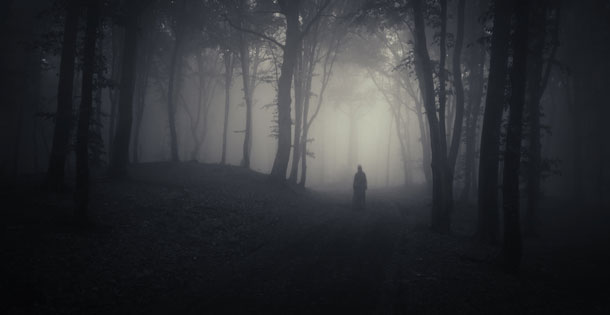The moors are always cold this time of year. I lift a half-frozen hand to make sure the buttons on my coat are fastened right up to the top, which of course, they are. I even try blowing hot air on my fingers to warm them, but it doesn’t work; my breath feels as bitter as the wind.
“Pointless,” I say, to no one. I could turn back, but I don’t want to, not yet.
I’ve always enjoyed my walks, even in this weather. I wander over the gently rolling hills, admiring the fallout from the never-ending battle of atmospheric presshe ures above me, creating bloated gray clouds that threaten an icy shower of rain. Around my feet, grass blades twist and bend at the slightest stroke of the wind. Walking here helps me to relax, sets my mind adrift. I often think about the future.
I’ve lived on the edge of Bodmin Moor for as long as I can remember. My parents left me a cottage when they died. It’s small but cozy, tucked away in one of the forest hamlets you’d only know about if you lived there all your life. When I was little, I’d help my father bring in logs for the fire, although I don’t know how much help I actually was; I’d get a bit carried away you see, picking logs that were too heavy and dropping them. Even so, Father never seemed to mind my clumsiness.
If I try hard enough, I can sometimes still smell Mother’s Sunday stew cooking on the stove, a fresh cut of salted beef from Lem’s farm bubbling in a pot with carrots and potatoes from the garden.
It’s a place filled with all my childhood memories, so I’m really going to miss it when I leave for London in a couple of weeks.
I’ve always wanted to live in London, right in the middle of the hustle and bustle of a big city. And of course, some of the best training hospitals in the country are there (it was my life’s ambition to be a nurse at one point). I casually mentioned the idea to Father once and, bless him, all the colour drained from his face! He started warning me about the blood and guts and other horrible things I’d see working in a hospital; I think he was trying to put me off. If he’d had his way he’d have seen me married to Lem’s oddball son and ready to take over the farm, spending the rest of my days knee deep in muck and endlessly milking cows. But London calls to me. Never got the chance to go though. When Mother became ill it was up to me to look after things at home. I stayed there for years after they passed, looking after the place, making sure the local children didn’t have any opportunities to vandalize it. I guess I was just attached to the place. But now I’ve decided it’s time to move on.
I always follow the same path when I take my walks: half a mile through the forest, then a good two-mile stretch along a stony path worn smooth by many feet, until I get to the fork that splits evenly down the middle. I always take the left path; never the right. It leads unwary travelers to parts of the moors even locals won’t go near, to wild and untamed woods and bogs that disguise themselves as solid ground, mouths open and ready to swallow unfortunate creatures into their bottomless dark bellies. I took the path once, after mother died, grief clouding my sensibilities. I lost my way in the darkness and tripped over a branch that had twisted its way out of the ground. By the time I awoke it was light again, and I found my way home. But I won’t ever go back.
So I take the left path, feeling safe in its familiarity. In the distance, the flat-topped silhouette of the famous Jamaica Inn sits on the horizon like a tomb. I shiver inside my coat, but not from the cold. I’ve never liked that place; always tried to avoid it if I could help it. Father had to travel there a few times when he went to meet certain city folk for business — it was the only real landmark for miles. He’d always come back with a strange look in his eyes saying “Stay away from that place, Sarah. Something ain’t right with it.”
I know all about the Inn’s history with smugglers and highwaymen, and that’s scary enough. But ask any of the village elders and they’ll tell you tales of the vengeful ghosts and hell-bound demons that linger within its walls, and have done for as long as anyone can remember …
The wind changes. Out of the corner of my eye, a floating head appears and hovers against a backdrop of sullen gray cloud. A scream gets lost inside my lungs and fear paralyzes me. The floating head pushes forward against the wind … then I see shoulders, and a body attached to legs making great strides over the grass. A stranger, dressed in shades of green from head-to-toe, an oversized bag slung across his back. The wind whips his short dark hair every which way. As I stare, he looks up and waves, catching me off guard. Beside him, a big shaggy gray dog trots obediently, pink tongue hanging from the side of its mouth.
The stranger moves quickly, slipping on grass which is still damp from the morning’s dew. The dog barks and its tail thwack thwacks against its hind legs. I narrow my eyes. As the stranger approaches, I see that he’s young, perhaps just a few years older than me. He’s pale, with dark circles and prominent cheekbones. But his eyes crinkle in the corners, reflecting his friendly smile. He stops a few feet in front me and grabs the dog by its collar.
“I’m sorry about Tess,” he says, nodding at the dog. “She didn’t scare you did she?”
“No,” I lie. “Not at all.”
The boy nods, leans forward and swings his bag over his shoulders, dropping it on the ground where it lands with a thud. I stare at it. It looks heavy and I wonder how long he’s had to carry it. He grins up at me and it’s infectious; I can’t help but smile back.
“What’s in there?” I ask.
“Equipment, mostly. And a few books and things to keep me amused.” His teeth are a little crooked, but perfectly white. “Of course, Tess’s more than enough to keep me entertained. I’m Peter by the way.”
“Sarah.”
“Well, it’s a pleasure to meet you, Sarah.”
There’s a long silence and, feeling self-conscious, I look away.
“So, you live around here?” asks Peter.
“Yes,” I say quickly. “A few miles that way.” I stick my thumb behind me to show him. He nods and looks around. “Must be nice living out here,” he says, winking. “All this fresh country air.”
“It’s okay,” I say. “But what I really want is to live in a big city.”
He laughs. It carries itself on the wind and sounds lovely.
“I don’t know about that myself,” he says. “I came down from London about a week ago. Glad to get away from it all really.”
“You’re from London?” I ask, eyes widening. “What’s it like?”
He looks surprised. “You’ve never been?”
“I’ve been thinking about moving there,” I explain.
The wind tears past us again and Tess whimpers. Peter pats her on the head. “Poor girl. She’s afraid of her own shadow. I found her sleeping in an alleyway in Bristol and she’s been with me ever since. Named her Tess after a character in a book I read years ago.”
I smile down at Tess. “So, if you’re from London, what are you doing all the way out here?”
“Traveling, mostly. I actually come here quite a lot. I enjoy the peace and quiet. But I’m planning to go back to Europe soon.”
“Go back?”
“Yes.” A strange sadness washes over him for a moment, and then it’s gone just as quickly. “I’m staying over there tonight,” he says, pointing to the Jamaica Inn. A cold hand strokes my spine.
“Really? But what about its history,” I hiss, whispering the last word as though something might overhear me.
“You mean all that nonsense about demons and evil spirits? No, no! It’s perfectly fine; I always stay there when I visit. I mean, there are a few odd characters — locals mainly — but everyone’s quite friendly.” He drops his head and stares at his boots, suddenly fascinated. “Uh, listen … if you’re not busy at all, you’re welcome to come and join me later. Have a drink or something at the bar —” he catches himself, embarrassed. “I mean, we could talk more about London too, if you like?”
I glance at the Inn, dark in the distance on an otherwise bright but cold afternoon. I suddenly recall Lem’s son and how nervous and stuttery he got whenever he spoke to me.
“Perhaps … perhaps I will,” I say. I feel giddy.
“Okay,” says Peter. He gives me one last smile and swings his bag back up onto his back. “I’ll meet you there. Say, 7 o’ clock?”
**
The sign hanging from the Jamaica Inn creaks ominously as I hover outside the front door, too nervous to just walk in. I hear my father’s voice in my head as though he were standing right next to me. Stay away, Sarah. Something ain’t right.
I take a deep breath and push open the door. The musty smell of stale beer and wood overwhelms me. I blink a couple of times and am surprised to find myself in a tiny room with people crammed round small round tables, drinking, laughing or playing cards. In the corner, an elderly man in a tweed waistcoat and matching trousers coughs loudly and addresses the room. “Has everybody got a piece of paper to write their answers on?” A few people shout and wave paper in the air.
“Okay, question number one. Who was the father of Cleopatra’s son, Ptolomy XV?”
“Sarah, over here!” Peter calls, waving to me from the bar. Tess is asleep on the floor by his feet. I smile behind my hair pick my way through the tables. Behind the bar, a stout bald man is wiping glasses with a vacant expression on his face. A young girl with a silver ring in her nose appears in front of us. “Don’t mind him,” she says, “he never notices anything around here. What can I get you?”
Nervously, I look around the room. Two serious men in long coats sit in silence, drinking from wooden steins. One of them is wearing an eye patch. In the middle of the room, a large red-faced woman wearing a brown petticoat like mine is conferring with a man in a suit of armour.
“I’ve never been here before,” I say. The barmaid grins.
“Well, it’s nice to meet you. Are you local? It’s off season for the living right now, so naturally, it’s the busiest time for folks like us.” She pours two drinks and pushes them towards us. “Just bear in mind — we’ve got two live ones over there, so try not to bother them too much.” She points towards a couple in the corner, who are quietly talking and completely oblivious of everything going on around them.
“No problem,” says Peter, grabbing the drinks. The girl smiles and turns around to replace one of the empty bottles on the wall. I notice a large bloody hole in the back of her head, swollen and fleshy against her jet-black hair.
“Question number two: During the first World War, what major event took place on 1st July 1916?”
Next to us, a man in a frilly neck ruff scribbles furiously onto a piece of parchment whilst trying to balance his severed head under his free arm.
“I know this one,” says Peter. He pulls back his dark-green jacket and shows me his blood-stained shirt. “First battle of the Somme; last battle for me.”
I study his wounds with interest. “The moors got me,” I say, pushing my petticoat aside and showing him my bent and twisted leg. “I fell and drowned in the marshes.” We share a small, sad smile and drink in silence.
“You know,” Peter says after a while, “Europe’s got a lot of big cities, some bigger than London, even. I think you’d like it.” He glances at me out of the corner of his eye. “You could come with us if you wanted. Tess and I could use the company.”
I sip my drink and picture the crumbling cottage on the edge of the moors, empty and gray for two centuries now. I think of my mother slipping gently into the light, of my father’s grief when I never came home, and how he himself slipped into the next world before I had the chance to say goodbye. I’ve wandered the moors for so long, hoping to see them again, hoping they’ll show me how to follow them into the light. But now I think it’s time to move on.
Become a Saturday Evening Post member and enjoy unlimited access. Subscribe now




Comments
Interesting ending, somewhat like Sixth Sense